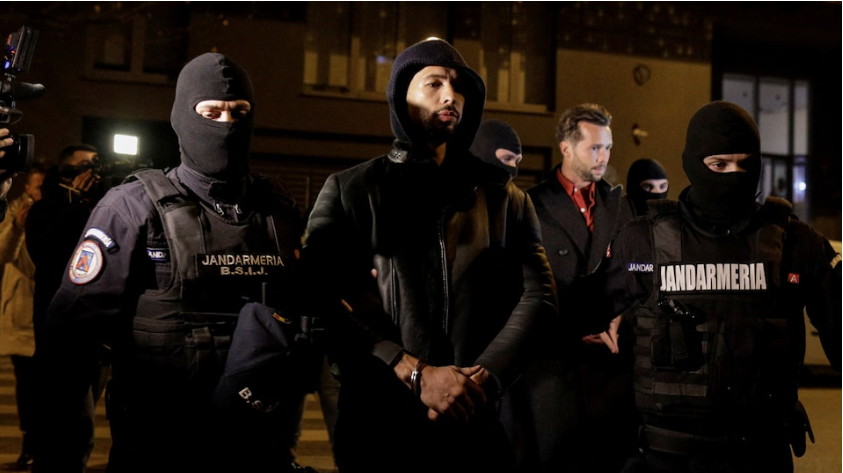As the Islamist response to the arrest of social media “influencer” Andrew Tate illustrates, the most striking divisions among Western Islamists increasingly revolve not around theological matters or religious animus imported from the Middle East and elsewhere, but around more conventional internecine strife advanced by the West’s radical Left and Right.
In December, with much coverage from media around the world, Romanian police arrested Tate as part of a human trafficking and rape investigation by the country’s organized crime bureau. Tate, who was reported in 2021 to be one of Google’s most searched persons in the world, is best known for his boasts of a playboy lifestyle and various misogynistic statements about the lesser status of women, leading to the removal of his accounts from dozens of social media and other web platforms, where he has enjoyed tens of millions of followers.
More importantly for FWI, Tate has praised Islam and the “intolerance” of Muslims as the “future,” in the face of the West’s “problems.” He has expressed admiration for Muslims who would kill to defend their faith from “mockery” and has taken part in conversations with prominent radical clerics. In the wake of these activities, in October 2022, Tate converted to Islam.
Following his arrest in Romania, media reported last week that Sameera Khan, a self-described American Muslim, “anti-woke journalist” and leading supporter of Andrew Tate, had spoken with the “Afghan Taliban” about their concern for the controversial social media “influencer.”
Khan had tweeted that the Taliban believe “westerners need Andrew Tate because we are oppressed by feminists.”
Such a claim is plausible. As FWI has previously investigated, Tate’s rhetoric, long before his conversion to Islam, appeared intriguingly similar to the ideas advanced by some hardline Islamists.
But whether Sameera Khan’s claim about the Taliban’s expressions of concern is true or not, such concerns are, at the very least, certainly held by some Islamists in the West.
Tam Khan, a Dubai-based British Muslim and self-described “Actor, Athlete, Entrepreneur, Father, Fighter, Muslim,” is a close friend of Tate’s. Khan has led calls for the charges against Tate to be dropped, and advanced various delusions, encouraged by the apparently savvy Tate, about ostensible dark forces at work.
Following Tate’s arrest, Khan appeared in various Islamist media, including The Deen Show, a Salafi-aligned Chicago-based YouTube channel with a half a million subscribers. Khan and host Eddie Redzovic advanced yet more conspiracies around Tate’s arrest, discussing Tate’s persecution in the context of other Islamist themes, such as persons “arrested in Guantanamo Bay for no reason.”
Separately, Khan posted a clip on his Twitter account, featuring a British dawah activist speaking with three British children, who had allegedly just “accepted Islam,” and who cited Andrew Tate as the reason behind their conversion. The street preacher wears clothes emblazoned with the logo of the iERA, a prominent British Salafi organization with a long history of extremism.
Meanwhile, Daniel Haqiqatjou, an enormously popular Islamist online activist best known for his warnings that “liberalism” and “progressivism” were serving to dilute Islam in the West, has fully embraced Tate’s own rhetoric. Haqiqatjou offers “three reasons” that Tate is innocent, including claims that the “Matrix” (a favorite albeit amorphous bogeyman for Tate) “has been trying to silence Brother Andrew at all costs. … The next best option, short of killing him, is putting him in prison” – all at the hands of the “powers that be.”
Some hardline Islamist voices expressed support for Tate more carefully. Roshan Salih, editor of the pro-Taliban 5 Pillars media outlet, echoed claims that the arrest of the social media “influencer” took place after Tate managed to “threaten” the “interests” of the mainstream media.
There are others from Islamist circles, however, who want nothing to do with Tate. Noticeably, all are from backgrounds that have been closely involved in progressivist causes.
New York-based Islamist activist Raja Abdulhaq, who mixes pro-Hamas activism with denunciations of “colonialism” and “capitalism,” criticized the “obsession Muslim men have for Andrew Tate.”
Meanwhile, Darakshan Raja, director of Muslims for Just Futures, denounced “abusers and traffickers like Andrew Tate.”
Debbie Almontaser, President of the Left-leaning Muslim Community Network, observed Tate’s “misogynistic agenda” made him suitable to “move to Afghanistan and be the Taliban mascot.”
As FWI has previously examined in detail, Tate is certainly an asset to those Islamists hoping to present Islam as a suitable replacement for the perceived excesses of progressivism – a threat felt, many suggest, not just by Muslims angry at their leaders for embracing the Left so tightly in the past, but by non-Muslims as well.
Correspondingly, Tate is also a threat to Islamist radicals hoping for a more careful effort to influence institutions and government – those who would adapt their language and behavior for the sake of political legitimacy.
Both sides of the Islamist spectrum charge the other with overlooking key Islamic tenets to advance their own extremist agendas. Defenders of Tate stand accused of ignoring Tate’s un-Islamic behavior and criminality; while his detractors are denounced for having diluted Islamic dogma to attract progressivist allies.
One curious conclusion is that Islamism in the West today is increasingly divided not along theological lines, but driven apart by the same dogmas dominating the radical Right and Left elsewhere in the West. The furor around Andrew Tate is further evidence that, for both sides, Islam itself appears increasingly irrelevant to the advancement of Islamism.
